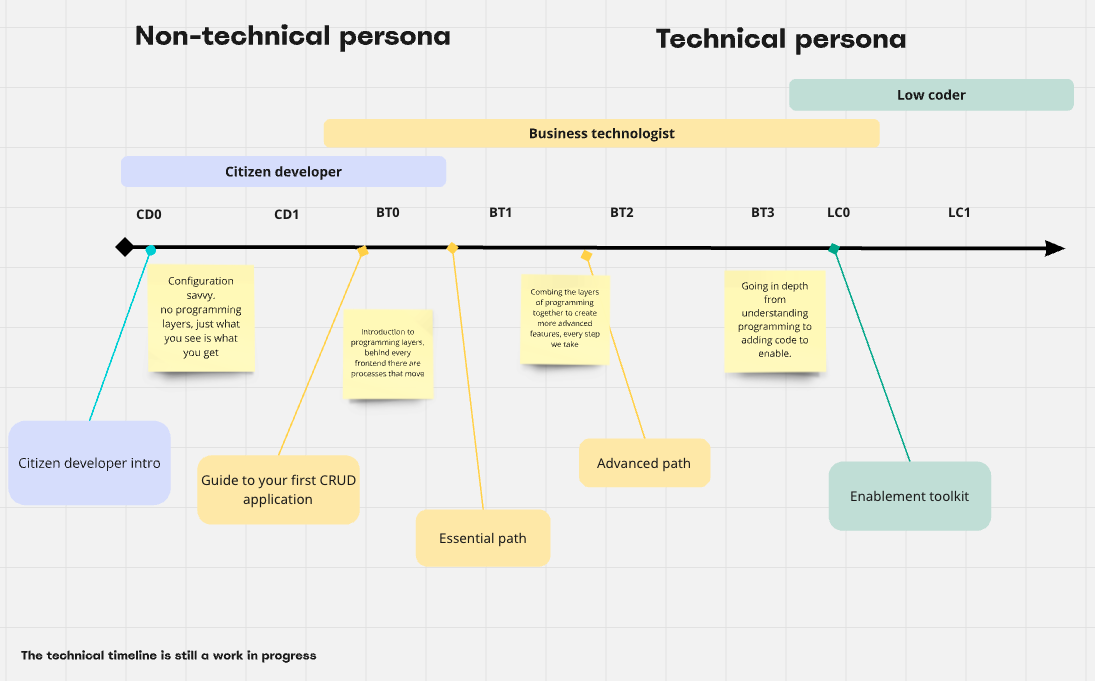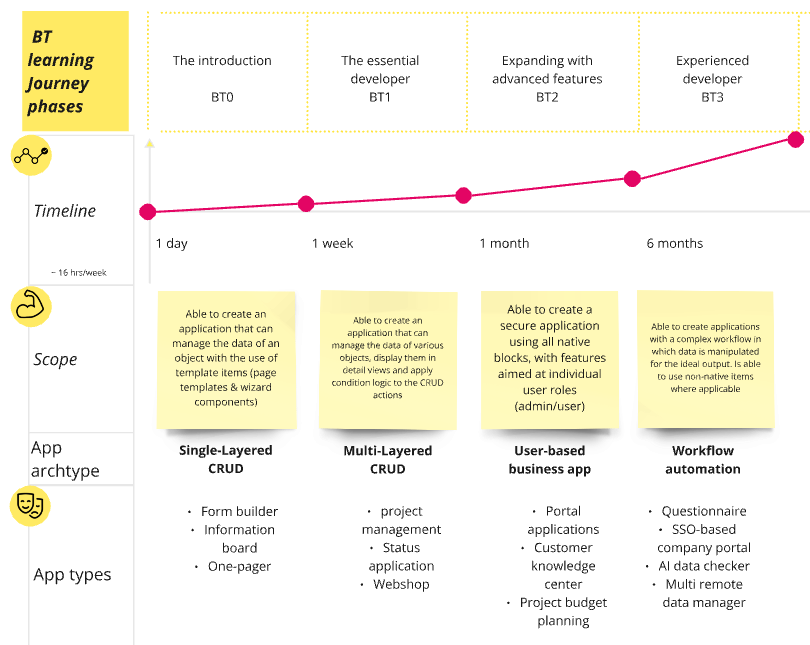Business technologist learning journey
A guideline on onboarding yourself on the Betty Blocks platform
In this article, we'd like to provide an average measure we have done in the platform, to help you get an idea of how to start or progress as a Betty Blocks business technologist.
-
Business technology journey
-
The persona
-
Phases of the business technologist (BT)
Betty Blocks learning journey exists out of multiple personas based on their technical levels. At Betty Blocks we want to help users of different technical levels move toward the application development level they aspire to.

Here we want to zoom in on the business technologist learning journey expectancy. Based on research and interviews, we have created a visual that shows the median learning line for various user groups to reach their goals.
BT maturity journey

The persona
The business technologist is an application developer with a narrow connection to the business. This persona often has a business-tech background, making them the ideal practitioner to build business applications. For more on the business technologist, we have created an in-depth article which can be found here.
Maturity phases of a business technologist
The journey for the BT in learning how to create applications lies in understanding the basics of programming (not coding).
A business technologist often starts with little knowledge about coding, but does have experience using applications and has worked with computer tools before. Therefore they can get started by learning the programming basics with help from wizards and pre-defined templates, while their increasing curiosity will assist them in diving deeper into the platform.
BT0: onboarding business technologist
The onboarding business technologist is here to introduce themselves to the platform and get an idea of what they can be capable of in a short period. After using some of the tools, we usually see an onboardee move onto the Essentials to get a full grasp on the development basics in a no/low-code environment.
-
Background: The onboarding business technologist is someone who has previously worked with Betty Blocks as a citizen developer and gained familiarity with the platform and how to configure an application, or is someone whose background includes using and configuring software tools. This persona understands that an application is built up in layers.
-
Tools for the BT0: The BTO, an onboardee, can start with the citizen development intro for a grasp of the platform and the development layers. Otherwise, or afterward, the user can dive into creating their first CRUD application by following our Guide to your first CRUD application.
-
Estimated time to BT0: 1 workday
-
Scope: Able to create an application that can manage the data of a single object with the use of template items (page templates & wizard components)
BT1: essential developer
A BT1 focuses on the platform essentials and can create a crud application with login based on the features available in the essential scoping. The BT1 initially gets 16 hours per week to learn and build on the platform and finishes the Betty Blocks essential path within a week.
-
Background: The BT1 developer usually starts with the introduction material as a BT0, or has some previous programming/SAAS knowledge, and is, therefore, able to recognise the basics of application layers (MVC = Pages/Actions/Data). This persona does need to learn the Betty Blocks essentials to get the basics of the platform.
-
Tools for the BT1: The essential learning path is made up of theoretical and practical video courses, and/or the essential path guide in our documentation environment.
-
Estimated time to BT1: 1 week (we estimate 12 to 16 working hours per week)
-
Scope: Able to create an application that can manage the data of various objects, display them in detail views, and apply condition logic to the CRUD actions.
BT2: advanced no-code developer
A BT2 uses the platform content to solve its own (more advanced) use cases and can create applications with fully-fledged automation flows and a proper data structure. The BT2 initially gets 16 hours per week to learn and build on the platform and finishes the Betty Blocks advanced path within 6 weeks (including the essentials).
-
Background: The BT2 developer followed the BT0 and BT1 path and continued their journey by expanding their essential application with advanced features. Or has introduced themselves to the platform using some of our introduction material, in combination with their previously gained programming/SAAS tool experience, and know how to make their way among the platform basics faster.
-
Tools for the BT2: The advanced learning path is made up of courses that tackle how to expand your application with features, or the often-used use case guides in our documentation. allowing the advanced developer to build features together with the standard application basis while gaining experience in the Betty Blocks platform.
-
Estimated time to BT2: 1 month (we estimate 12 to 16 working hours per week)
-
Scope: Able to create a secure application using all native blocks, with features aimed at individual user roles (admin/user)
BT3: experienced no-code developer
The BT3 developer, the experienced no-code developer, often moves in the direction of having sufficient programming knowledge due to their experience in working with the application layers and the Betty Blocks process logic. These developers sometimes have coding experience, but for their use cases won’t use any coding to create their applications. The only time we see them step away is to use HTML/Liquid to generate PDF or email templates.
-
Background: The BT3 developer followed the BT0 to the BT2 path and continued their journey by expanding their advanced platform knowledge with the time they spent tweaking their applications to their clients' needs and wishes. The more (or in-depth) applications the BT3 will create, the more experienced we may consider this developer.
-
Tools for the BT3: There is currently no video path for the BT3 developer, as most of this knowledge is made up of specific use-case experience and time on the platform, however, these users often can be seen using our use-case documentation or the Betty Blocks community to tackle specific topics.
-
Estimated time to BT3: 6 months (we estimate 12 to 16 working hours per week)
-
Scope: Able to create applications with a complex workflow in which data is manipulated for the ideal output. Can use non-native items where applicable (Block Store items, created by Betty Blocks or other developers).
The four development phases the Education team currently sees are based on feedback from customers, our premium developer support team, and data research we have been able to do from our documentation and learning environment.
These phases and estimates may, however, vary per person! It is important to note that this is a general guideline we have seen among our customers. Some may find it more difficult to move towards a new level because they don’t align with the thought process of a design course or doing data model normalization.
We all have our unique skill sets that we should use with care, and for advice, the Betty Blocks Education team is more than happy to assist.